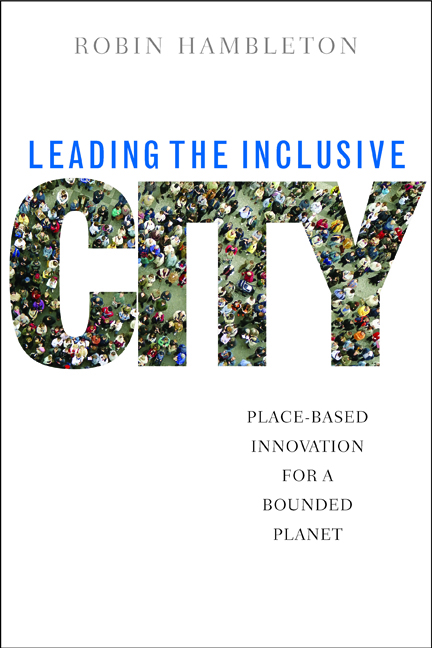Book contents
- Frontmatter
- Dedication
- Contents
- List of figures
- List of innovation stories
- About the author
- Preface
- A guide to the book
- Overview
- Part 1 Diagnosis: Understanding trends and challenges
- Part 2 Concepts: Place, leadership, innovation and democratic governance
- Part 3 Experiences: Place-based leadership in action
- Part 4 Lesson drawing: Insights and international learning
- Notes
- Appendix: International city networks and resources
- Acknowledgements
- References
- Index
Three - The changing nature of public service reform
Published online by Cambridge University Press: 08 March 2022
- Frontmatter
- Dedication
- Contents
- List of figures
- List of innovation stories
- About the author
- Preface
- A guide to the book
- Overview
- Part 1 Diagnosis: Understanding trends and challenges
- Part 2 Concepts: Place, leadership, innovation and democratic governance
- Part 3 Experiences: Place-based leadership in action
- Part 4 Lesson drawing: Insights and international learning
- Notes
- Appendix: International city networks and resources
- Acknowledgements
- References
- Index
Summary
All private effort, all individual philanthropy, sinks into insignificance compared with the organised power of a great representative assembly like this
Joseph Chamberlain, Mayor of Birmingham, speaking to Birmingham City Council, 10 November 1875
Introduction
In the 1860s Birmingham, like all the other industrial cities of England, was a bleak and forbidding place with insanitary streets, dilapidated housing and grinding poverty. The historian Tristram Hunt provides a particularly vivid account of the miserable living conditions, and suggests that, at the time, it was ‘a disgusting city’ (Hunt 2004, 324). Joseph Chamberlain, who arrived in the West Midlands in 1854 and became a successful businessman, was inspired by the Revd George Dawson and other civic activists to stand for election to the city council in 1869. In 1873, at the age of 37, he was to become Mayor of Birmingham and, as we shall soon see, in a short space of time he led a successful effort to transform the quality of life for the residents of the city. He pursued an entirely new approach to the philosophy and functions of municipal government.
As the above quote from his speech on the importance of the City Council implies, he imagined the city as an organic whole whose purpose was to improve the quality of life for all its citizens. Hunt (2004) describes this approach as a ‘municipal gospel’, encompassing a firm belief that elected local authorities could be much more effective in helping communities solve problems than distant politicians in Westminster. Chamberlain's strategy, involving well-managed civic investment to reverse the process of urban decay, provides a remarkable early example of public service reform in action. We will return to the achievements of Chamberlain, Dawson and their colleagues in Birmingham shortly.
Here, however, I want to note how Joseph Chamberlain's civic leadership efforts highlight two themes that we will revisit during this and subsequent chapters. First, important public service reforms often stem from place-based initiatives of various kinds. For example, if we track back to the origins of modern social, health, education and housing services we usually find inspirational activists who were moved to take action at the local level.
- Type
- Chapter
- Information
- Leading the Inclusive CityPlace-Based Innovation for a Bounded Planet, pp. 55 - 76Publisher: Bristol University PressPrint publication year: 2014



